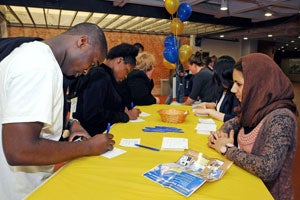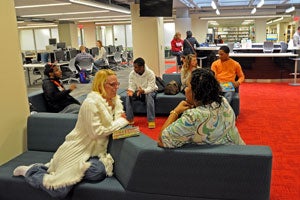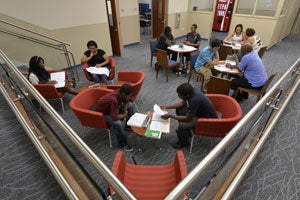Educational Foundation Mini-Grant Awards
The Carter Center welcomes all faculty (full-time and part-time) to apply for an Educational Foundation Mini-Grant.
Program Overview
Mini-Grants provide an opportunity for faculty to receive grant funding for a project that will promote and support excellence in teaching and student learning. The project should��provide measurable, student-centered outcomes��while aligning with the mission and goals of The Carter Center.
Mini-Grants are funded by the Educational Foundation Board of �����ϲ� and made available through The Carter Center.
Proposals will be evaluated (see criteria below) by members of the Professional Development Committee (PDC). The PDC will forward recommended proposals to the Educational Foundation Board for final review and approval.
The recipients of the Educational Foundation Mini-Grant��will be announced at the last General Faculty Meeting in April or May.
Program Timeline
- Consult with��and receive approval from your dean.
- by the deadline (located on The Carter Center's delaGATE page).
- Applications are due by Monday, February 3, 2025.
- The PDC reviews the applications and makes recommendations to the Educational Foundation Board.����
- The Educational Foundation Board makes the final decision on Mini-Grant awards.
- Faculty will be notified of award decisions in April.
- Mini-Grant��recipients announced during the April or May General Faculty Meeting.
Project Proposal Evaluation Criteria
- The proposal aligns itself with the mission and goals of The Carter Center.
- The proposal provides a clear and detailed description of your project, including��a timeline.
- The proposal��includes a brief itemized budget outlining the use of the requested funds.
- A typical budget submission might include line items for travel expenses, supplies, equipment, stipend amount (if applicable), and personnel expenses (such as clerical needs). Try to be as specific as reasonably possible.
- The proposal identifies the sustainability of the project once grant funds have been exhausted.
- The proposal identifies cross-functional collaboration amongst disciplines and/or faculty where possible.
- The proposal identifies how you will measure the outcomes of your project (outcomes should be student-centered, observable, and measurable).
- The proposal includes a plan for reporting results to faculty and the Educational Foundation Board (Example: a synopsis report or a brief presentation during a scheduled faculty meeting or professional development day).
- The proposal explains how the implementation of the project will impact teaching.
- The proposal��explains how the implementation of the��project��will impact student success and/or retention and why.
Award Recipients
2024
Carly Ellman
Service Learning Meets Social Work at �����ϲ�
Naomi Machell, Anne-Marie Verenna��
The Addition of Human Anatomy & Physiology Student Group Study Kits for the A&P Study Room, Marple Campus
2023
Michael LaMagna,��Andrea Rodgers
Bring the Library’s Print Collection into the Future Through a Large-scale Collection Analysis
Megan Trexler,��Kathy Hastings
Supporting Innovative, Research-Based Literacy Instruction Across the Disciplines
2022
Stephen Smith
Shakespeare Under the Stars at DCCC: A Summer Shakespeare Collaboration Between �����ϲ� and the Hedgerow Theatre
2019
Robert Jones
Community college students’ use of creative thinking skills, self-regulation, and critical thinking disposition as potential mediators to creative problem-solving
Jon Sagle
Active Physics Education in University and College Physics II Courses
2018
Susan Ray�� �� ����
Rethinking Our Students' Relationship with Technology: Tackling Smartphones in the Classroom
Christine Doyle �� ����
Bringing in the Bystander: A Prevention Initiative for Establishing a Community of Responsibility around Sexual Violence
Anne-Marie Verenna,��Naomi Machell
Axial Bone Models for Anatomy & Physiology Student Use in the Learning Commons on Delaware and Chester County Campuses
2017
Keeley Mitchell Wallace
Paralegal Studies Clinical Program
Olivia Florek
Art History and Interdisciplinarity: Picturing the Modern Monarch
2016
Tanya Franklin
Student and Faculty Success: There's an App for That!
2015
Fiona Geiser,��Meredith Much
Starting the Conversation about Tobacco Intervention
Naomi Machell,��Anne-Marie Verenna
Anatomy and Physiology Student Desktop Human Skeletons for the Learning Commons Across Campuses
Tanya Gardner
Service Learning Integration at the College
2014
Fiona Geiser
Guided Inquiry Laboratory on Tobacco Exposure
Linda Flora
First-Person Video Recordings of Anatomy and Physiology Lab Dissections
��
2013
Sharvette Law-Philmon, Susan Scalzi
Innovative Practices Using iPad Technology in Allied Health
Lauren Donovan, Sarah Murphy
Service Learning Project: Promoting the Benefits of Sleep to College Students
2012
Jaime Treadwell
Inflated Colossal Campus Installations
Fiona Geiser
Student Project on Second-Hand Smoke Exposure Using NicAlert Urine Strips
2011
Susan Ward
Working with Quality Matters Certification Training
Debra Metz, Kathy Schank, Jeffrey LaMonica
Collaborative Teaching and Learning: An Interdisciplinary Resource Guide
2010
Pam Santarlasci
Student Readmission and Retention in an Associate Degree Nursing Program
2009
Ingrid Callenberger, Jennifer Conley, Beiye Gu,��Patrick McGinty, Ann-Marie Smith
English as a Second Language Online Resource Center
Audrey Ervin
*Infusing Cross-Cultural Perspectives in the Classroom: Using��Technology to Foster Critical Thinking and Deepen Global Understanding
2008
Larry Woodward, Glenn Artman, Pat Barnes
*Contextual Teaching and Learning: Coordination of ENG 50, MATH�� 060, TECH COMM III
Erica Danowitz, Alysia Peich
Providing Librarian Skills Classes for �����ϲ�Online Learners
2007
Ife Williams
Political, Historical, Cultural Legacies of the Caribbean
2006
Ann-Marie Smith
E-Portfolio Initiative
Sandra Connelly, Lisa Barnes
College-Wide Reading Initiative
Steve Aquilani
Development of an International Field Course, Natural History of South Africa
2005
Beth Carpenter
English 50 Course Design
Lana DeRuyter
African-American Students’ Experiences in a Dominant Culture Academic Associate Degree Nursing Program
Dianne Peich
Future of the Writing Center at DCCC
*Awarded, but have not been pursued by original proposers for specific reasons.








